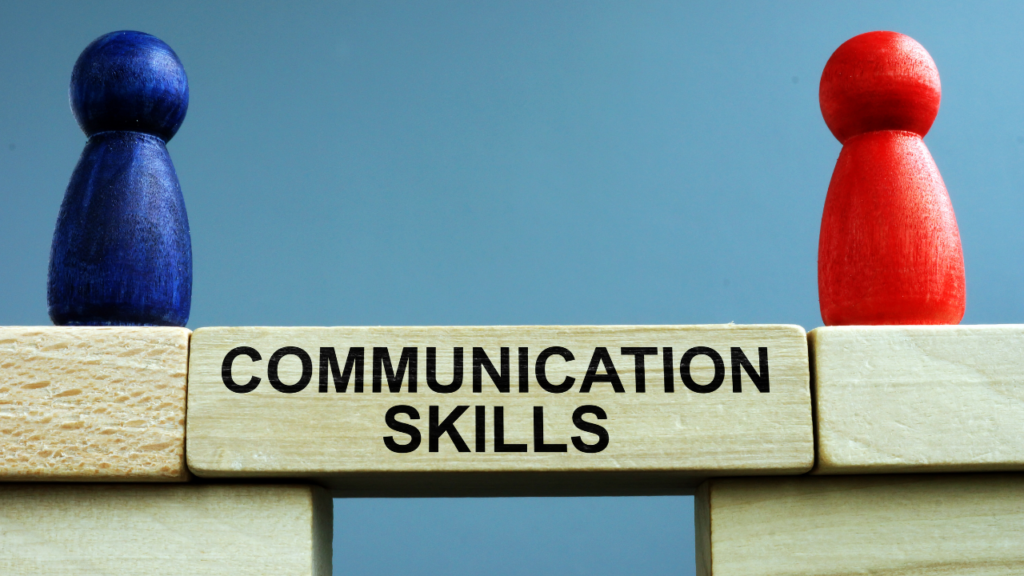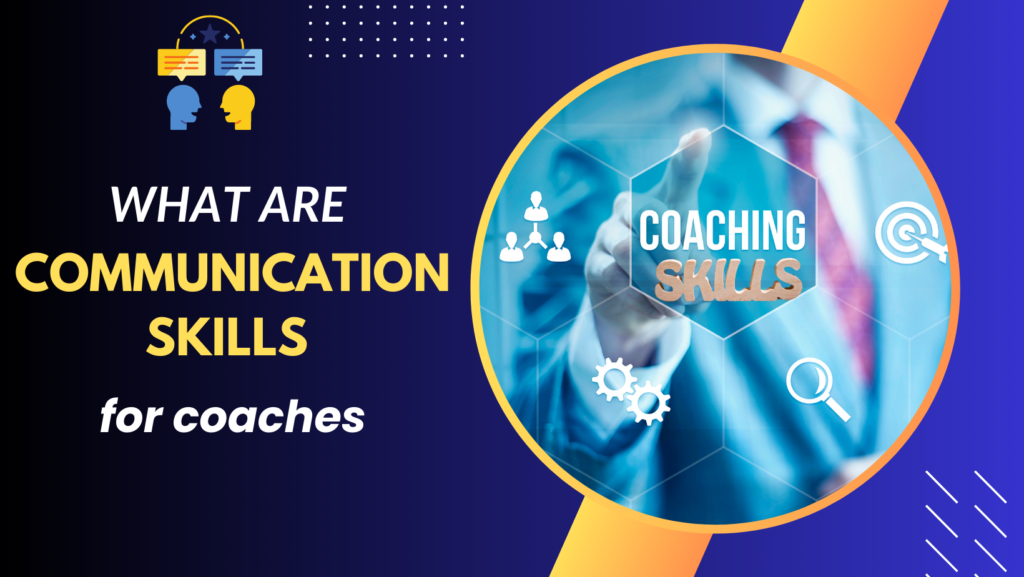Effective coaching relies on good communication. Trust is essential in a coach-athlete relationship, and honest dialogue helps to develop that trust. Communication is more than an inborn talent; even if you are naturally personable, there are ways to refine your communication skills further. If you take the time to practice & refine this skill, your progress will be improved.
Strong communication skills for coaches are essential for any professional, as it allows them to form relationships, express their ideas, and perform their job duties. A communication coach could be the answer if you need help developing these skills. In this article, we discuss what coaching communication is an advantage of hiring a coach to help you improve your social abilities.
Table of Contents
ToggleWhat is the definition of communication?
Communication involves the exchange of ideas, information, knowledge, thoughts & feelings. It can be verbal (spoken) or nonverbal (using actions, body language & gestures). It can take place between two people or in a group setting. It can be written down (e.g., printed material) or visual (pictures, videos, etc.). The content of the message is essential, but so is its emotional impact – how it makes the recipient feel.

What is coaching communication?
Communication coaching is a service trained professionals provide to teach people how to communicate effectively. Communication coaches can tailor their approach to suit the individual needs of their clients, helping them develop & strengthen their communication skills for both professional & personal purposes. Common issues addressed include:
- Social fear or uneasiness in social situations.
- Issues in romantic & business partnerships.
- Lack of confidence & self-esteem.
- Misunderstandings between people.
- Struggling to express oneself.
- Need help understanding people’s body language & how to interpret social cues.
- Need help with speaking clearly.
- Negotiating business contracts.
How can I improve my communication skills?
Developing strong communication skills can help you become a better coach. Examine your communication strengths & weaknesses & focus on improving the more challenging areas for you. Create new habits by regularly practicing, reviewing your progress after each interaction, & be honest with yourself about how well you are doing. Improving your communication will benefit both you & your clients.
What are communication skills for coaches?
Listening actively
In face-to-face conversations, improving your active listening skills starts with paying close attention to what the other person is saying. To actively listen, focus on each word they say & take time to process it as they speak. Here are some ways to sharpen your active listening skills:
- Body language can express a person’s feelings; for example, crossed arms or a clenched jaw may indicate anger, while relaxed hands & strong eye contact can suggest friendliness. Suppose a person fidgets after you ask them a question. In that case, they might feel uncomfortable or ready, to tell the truth.
- Show understanding by smiling & nodding while the other person speaks. Use a friendly tone of voice to make them feel comfortable.
- If someone delivers bad news, you can show empathy by mirroring their facial expressions or body language. Don’t stare if they are avoiding eye contact, & if their posture is rigid, adopt an upright posture to make them more comfortable; This will demonstrate your emotional intelligence & reassure the client that you are there to help.
- When having a conversation, make sure to look at the person speaking & show that you are engaged by nodding & displaying positive body language.
- Visualizing the speaker’s words instead of thinking about your worries or ideas can help you focus on what is being said.
- Avoid interrupting or finishing sentences for them.
- Wait for a pause & then ask relevant questions.
- Showing understanding for the speaker.
- Paying attention to body language such as posture, eye contact, & facial expressions.
- Summarising the speaker’s words to ensure understanding
To improve your coaching & mentoring skills, you can practice active listening exercises with a colleague; This may involve roleplaying conversations, displaying positive & negative listening behaviors & discussing how each one made you feel.
In a coaching or mentoring session, try to minimize distractions & be OK with silence. Aim to speak 20% of the time so the other person can talk for 80%. By learning how to listen effectively, you will be able to develop other coaching & mentoring skills.

Communicating
Effective communication is essential for coaches & mentors,
- So that they can talk about a person’s feelings, thoughts, or problems in a sensitive manner.
- This also means being aware of how the other person might interpret what you say & changing it if necessary to ensure that your meaning is understood correctly.
- As a coach, it is important to communicate respectfully by making suggestions rather than demanding action.
- Ask questions like “What do you think of?” or “Is it OK if…?” instead of telling people what to do with phrases like “I think you should…” & “Why didn’t you…?”.
Confidence
As a coach, you can have an impact on your clients. To gain their trust in your skills & advice, speak with confidence. Here are ways to do this:
- If you want to be understood, speak clearly & at a reasonable volume. Take your time when talking to focus on your words; This is even more important during phone calls, as there may be interruptions or poor connections.
- Having good posture can give off the impression that you are confident. Sitting up straight while talking to clients can demonstrate this, even if you’re having a bad day. Doing so can also help them believe in themselves.
Asking questions
Questioning is a valuable tool for coaches, who use it to engage their coachees & help them come up with their own ideas or solutions. It helps direct the conversation & encourages the coachee to actively participate in creating change.
Practice and preparation are key.
When trying to help someone, it is important to consider their individual needs & preferences. Taking notes, planning ahead, & appearing confident in the conversation can ensure the best possible outcome. To do this, you should:
- Having a plan for each conversation can help keep focus & make sure the client gets what they need. Even though conversations may take unexpected turns, starting with a plan of what you want to accomplish is important. Having a plan is helpful if the client has something specific they want to talk about or is not feeling talkative.
- Listen to your client & don’t be afraid of tangents; bringing them back on track will benefit everyone in the long run.
- Suppose you are confident in your ability to speak. In that case, it is still a good idea to practice delivering difficult or complicated messages before delivering them so that you can find the right words.
Having understanding & sympathy
Coaches & mentors need to understand how a person is feeling, so they can offer the best advice; This includes recognizing any negative thoughts or mental blocks that may be preventing them from reaching their potential, even if the person isn’t aware of them.
Being friendly
Invite your clients to connect with you by displaying kindness & warmth. As a coach, your aim is to encourage your clients to communicate openly. Here are ways you can do this:
- Communicate openly by engaging in the conversation & not acting distant even though you are in a position of authority. Keep your body language relaxed to make them feel comfortable & do not take up too much space during the exchange. Listen carefully with an open mind & invite your clients to speak honestly.
- Before getting started, please take a moment to ask your client how their day is going. This simple gesture helps break the ice & puts them at ease, reminding them that you care.
- Pay attention to your clients & ask questions that show you care. For example, if they went somewhere over the weekend, ask them how it went. Show that you are a good listener by remembering what they tell you about their lives.
Be clear
When giving advice & feedback, it’s best to be direct. Avoid waffling or changing your mind, as this can lead to a lack of trust. Your clients have placed their trust in you to help them, so show them you are confident in your solutions by expressing yourself clearly. Here are some tips:
- Keep it short: Say what you need to in as few words as possible. It’s easier to understand more concise messages.
- Be direct in your communication & avoid unnecessary words. Get to the point quickly & be clear about what you mean. Doing so will help ensure your client understands the important details.
Setting goals
Coaches should help their coachees to set the:
- Specific, measurable, achievable, relevant & time-based (SMART) goals.
- They should also help them stay focused on these goals by discussing how the coachee’s actions are either helping or hindering their progress.
- Finally, coaches should encourage their coachees to see obstacles as opportunities for improvement rather than being discouraged by them.
Be honest
It is important, to be honest & straightforward when assessing a client’s situation & informing them of the next steps. It can be challenging to share tough truths. However, your clients will feel supported if you do so in a kind & understanding manner.
- Encourage honesty during your conversations. Tell your clients they can be open & honest with you, even if the topics are challenging. Assure them that you’re there to help & won’t judge them. You can also demonstrate honesty in return by sharing similar experiences or challenges you’ve faced; This will help your client feel comfortable & understood.
- Deal with problems as they arise: Don’t avoid topics that may be hard to discuss. Have a quick & clear conversation about these tough subjects instead.
- Act with understanding: Create a safe space by trying to understand how the client is feeling & putting yourself in their position.
Check-in regularly
Regularly checking in with the individual you are working with is essential. Ask if they know what action they will take if they are satisfied with it, & what the next steps for your sessions will be. Additionally, make sure you check your understanding of them by summarizing what you think was said – this helps ensure that both of you have a mutual agreement.
Show respect
Be polite, clear, & truthful but also show respect; This will help maintain your position of authority & remind your client that this is a professional working relationship. Here are some tips for demonstrating respect in conversation:
- Mentioning someone’s name in conversation can show you’re interested and make the listener feel good by triggering the release of serotonin in their brain.
- If you need to take notes, wait until the client has finished speaking before interjecting. Then respond clearly while addressing any points from your notes. Avoid interrupting the conversation.
- Give the client time to process: It can be tempting to fill up a conversation during a session, but giving the client time to consider their thoughts can be beneficial for gaining insights.
Showing enthusiasm
Having enthusiasm requires intention & effort, but it is ultimately worth it.
- Being enthusiastic helps build strong relationships with people
- Leading them to trust you more
- Get the best results from them.
Provide feedback
Coaching is an ever-changing partnership. If you have any ideas, feel free to share them with the client. They are there to benefit from your advice.
- It is important to observe & note any issues, but it is also essential to provide solutions that the client can take action on.
- Invite feedback: Let your client know that you value their input & are open to hearing any constructive feedback they may have about the coaching relationship.
Coaching benefits
Coaching is an effective way to help employees improve communication skills, such as email writing, speaking to upper management, presenting in front of others & understanding how to interact differently in different situations.
A good coach will be empathetic & ask the employee what they think instead of imposing their views. Through individual coaching sessions, the coach & participant can better understand each other & the coach can offer more relevant feedback.
Poor communication can cost businesses a lot – $62.4 million per year for companies with 100,000 employees on average – making it essential that organizations invest in communication programs that enable productive change. Studies show that implementing social technologies to improve communication & collaboration could boost worker productivity by up to 25%.

The Benefits of Using Coaching for Communication
A coach who is productive encourages open communication by taking steps to remove any obstacles that might prevent it.
Achieving Objectives
A communication coach helps an employee understand that success is achieved through minor improvements. Setting clear goals & working together is essential for improving communication skills.
- Analyze the weaknesses of the employee.
- Set achievable goals.
- Ensure that the employee is consistently using the relevant communication activity.
A coach can help break down a difficult task by using goal-setting models like GROW, SMART, & PDCA. The coach should explain the model to their employee & let them fill in the details. Goals need to be specific with milestones, feedback sessions & a timeline for completion. To ensure progress is being made, goals should be reviewed regularly.
Providing assistance and care
Having someone to be accountable to can dramatically increase the likelihood of achieving a goal. According to the Association for Training & Development, having an accountability appointment with someone you’ve communicated your goals results in a success rate of 95%. Having just a goal yields about a 10% success rate with a coach or accountability partner.
Giving objective advice
A communication coach helps their participants improve their communication skills without any bias. The coach can identify an individual’s unique challenges & provide objective feedback & guidance, allowing them to develop better strategies for communicating within an organization.

Assessing the effectiveness of coaching
It is essential to assess the effect of your coaching sessions. The person you are working with may find it motivating & encouraging to observe their improvement. At the same time, you (as the coach) can adjust your approach in the future based on what works best.
There are several ways to measure the success of coaching, such as:
- Before & after the coaching process, 360-degree feedback programs involve individuals receiving confidential, anonymous feedback from their manager & peers.
- Conducting surveys to measure employee engagement & satisfaction.
- Completion or advancement in individual development plans/action plans.
- The attainment of the goals set by coaching.
- Promotion rate or ability to be promoted.
It is essential to establish objectives that both the coach & coachee can agree on before beginning a coaching session; This will help measure the success or impact of the coaching in the future. For example, these objectives include assisting the individual in feeling ready for an upcoming promotion.
FAQ
Why is it important to communicate effectively?
Good communication skills are essential for leading a successful life. People with strong communication can easily build relationships & trust with others. They also know how to adjust their style of speaking depending on who they’re talking to & the circumstances they’re in.
How should the Q&A session be organized?
It’s important to plan for the Q&A session at the end of a presentation, as an absence of questions can make it appear that no one was engaged with the message.
What are the different types of communication styles?
Some people are better communicators than others because they have the ability to adjust their style to fit the situation, message, & conversation. This skill comes from combining natural talents with formal education & life experiences.
How can you identify different communication styles?
Individuals can change their communication style to suit a particular situation, which makes them appear knowledgeable, confident, & understanding.
How does one’s attitude impact communication?
Effective communication involves understanding the feelings & emotions of other people or groups. This can be done by paying attention to their behavior, which will give clues about their attitude toward conversation.
What research is relevant to communication in the workplace?
There are many resources available to help people become better communicators, but some of the information provided may not be accurate.
Overview
Strengthening communication skills takes time & effort. First, identify the areas of improvement, then set a goal. Finally, practice strengthening weak communication skills. Organizations often use coaching to help employees become better communicators. It won’t happen overnight, but with dedication & hard work, it is possible to become an expert communicator.











